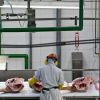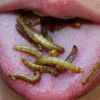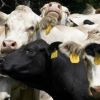-
 +31 +1
+31 +1I used GE's smart indoor smoker to make authentic BBQ in my kitchen, and it's $300 off right now
The Smart Indoor Smoker by GE allows barbecue enthusiasts to enjoy an authentic smoking experience in their home kitchen, just in time for the Super Bowl.
-
 +37 +1
+37 +1Back to Basics: The 10 Essential Secrets to a Perfect Burger
Master the art of grilling perfect burgers with these 10 essential steps and share your best Burger Tips!
-
 +45 +1
+45 +1Digging In: Why Don’t Americans Eat Mutton?
The idea of mutton leaves a bad taste for many US consumers—most of whom have never even tried it.
-
 +24 +1
+24 +1Offaly Delicious: Can the US Learn to Love Organ Meats Again?
It may be time to get rid of our hang-ups regarding offal. Not only can offal be a more sustainable choice, in many cases, offal meats are actually more nutritious than their skeletal meat counterparts.
-
 +34 +1
+34 +1Cultivated meat: Lab-grown meat without killing animals
For thousands of years, humans have slaughtered animals for meat. But Dr. Uma Valeti dreamt of a different way: eating chicken without having to kill a chicken. He figured out how to "grow" meat directly from animal cells. It's completely different from the meat alternatives Beyond Meat or Impossible, which are made from plant-based ingredients, including vegetable proteins. "This is real meat, no compromise, made in front of you," Valeti said.
-
 +4 +1
+4 +1The Startup Bringing Home The $400B Bacon…Minus The Pig
With 30 million dollars worth of series A funding, cultivated meat startup Uncommon plans to take pork to sustainable and healthy new heights. The stakes couldn’t be higher. Our insatiable appetite for meat is putting tremendous strain on the environment. Water resources are rapidly drained. Rainforests are ravaged for grain. Rivers run thick with effluent. Antibiotics used on farm animals put our health at grave risk.
-
 +23 +1
+23 +1Inside big beef’s climate messaging machine: confuse, defend and downplay
A Masters of Beef Advocacy program teaches ‘scientific sounding’ arguments on cattle’s sustainability in an all-out public relations war
-
 +18 +1
+18 +1Report: German Meat Consumption Declined in 2022, At Lowest Point Since Data Collection Began in 1989
According to the report in 2022 per capita meat consumption dropped from 56.2 kilograms per person to 52, a 7.5% decrease. No year between 1989 and 2022 has seen a lower kilogram per person rate for meat consumption. In terms of specific meat products, in 2022 Germans ate roughly 10% less pork (2.8 kg per person), 2.9% less poultry (400 grams per person) and 8.2% less beef/veal (900 grams per person).
-
 +13 +1
+13 +1How the meat industry indoctrinates children, explained by a viral story of a girl and her goat
The story of a California girl and her goat named Cedar, which captured national and international headlines this past week, almost reads like it could have been penned by a Hollywood screenwriter. The tale of a child battling cruel adults for the life of a beloved animal companion has been the plot of everything from a classic children’s story (Charlotte’s Web), sci-fi film (2017’s Okja), and even an episode of The Simpsons (“Apocalypse Cow”).
-
 +24 +1
+24 +1A Meatball from a long-extinct mammoth created by food firm
A mammoth meatball has been created by a cultivated meat company, resurrecting the flesh of the long-extinct animals. The project aims to demonstrate the potential of meat grown from cells, without the slaughter of animals, and to highlight the link between large-scale livestock production and the destruction of wildlife and the climate crisis.
-
 +22 +1
+22 +1The meat industry blocked the IPCC’s attempt to recommend a plant-based diet
It’s no secret that climate change discourse is shrouded in obfuscation, disinformation, greenwashing and lies, both outright and of omission. But a recent leak of a draft of the Intergovernmental Panel on Climate Change (IPCC) report released on March 20 has been particularly enlightening when it comes to just how much how delegations negotiate, watered down, and delete scientists’ findings.
-
 +17 +1
+17 +1Tyson Foods to lay off 1,700 workers, close two chicken plants
Tyson Foods will close two chicken plants in May, affecting nearly 1,700 employees. “While the decision was not easy, it reflects our broader strategy to strengthen our poultry business by optimizing operations and utilizing full available capacity at each plant,” Tyson said in a statement to CNBC.
-
 +19 +1
+19 +1Students ate less meat in the three years after hearing talk on its negative environmental impacts
A trio of climate scientists from Occidental College, Claremont Graduate University and the University of California, respectively, has found that after a 50-minute talk outlining the negative environmental impacts of raising and consuming meat, students ate on average 9% less meat over the following three years. In their paper published in the journal Nature Food, Andrew Jalil, Joshua Tasoff and Arturo Vargas Bustamante describe analyzing the eating habits of student volunteers.
-
 +11 +1
+11 +1China’s Pig High-Rises Are Horrifying. So Are America’s Factory Farms.
Every few months in recent years, Western news readers have been treated to a macabre tale: companies in China building massive multistory pig factory farms to feed the country’s appetite for pork. The agro-industrial phantasmagoria grows in scale with every iteration.
-
 +18 +1
+18 +1EU approves two insects for human consumption
The maggot-like larvae of lesser mealworms — a type of shiny black beetle — and house crickets will become the third and fourth insects that can be sold as food for people in the European Union. Eight more applications await approval. On Tuesday, the EU gave the greenlight to the sale of the larvae in powder, frozen, paste, and dried forms. The crickets can be sold as partially defatted powder. For many Europeans, the thought of eating creatures that wriggle or crawl in any form isn't exactly appealing.
-
 +10 +1
+10 +1No, Mars will not be Vegetarian
Once again, the idea that space is going to be Vegetarian, is making the rounds of social media. There is close to no chance of that happening. If people can live there, they can make a profit raising meat there, and will. Only violence against those that want to do it can prevent it. That level of violence is costly, has little chance of succeeding and would most likely see the project ended.
-
 +15 +1
+15 +1For 2 million years, humans ate meat and little else — study
Israeli researchers studying the nutrition of Stone Age humans say the species spent some 2 million years as hyper-carnivorous “apex predators” that ate mostly the meat of large animals. The study at Tel Aviv University, in collaboration with Portugal’s University of Minho, challenges views that prehistoric humans were omnivores and that their eating habits can be compared to those of modern humans, TAU said in a statement.
-
 +20 +1
+20 +1‘I’ll stop saying I don’t eat meat – and tell people I don’t eat animals’: the thing I’ll do differently in 2023
I don’t think I’ve ever made a new year resolution. But this year I’m going to stop telling people that I don’t eat meat. It’s not that I do eat meat – I don’t. The thing is, when I tell people that I don’t eat meat, I’m saying it to be polite. I use that form of words because I don’t want to offend people. So, from now on I’m going to be more honest. I’m just going to tell people that I don’t eat animals.
-
 +16 +1
+16 +1McDonald’s and Walmart beef suppliers criticised for ‘reckless’ antibiotics use
Suppliers of beef to McDonald’s, Taco Bell and Walmart are sourcing meat from US farms that use antibiotics linked to the spread of dangerous superbugs, an investigation has found. Unpublished US government records obtained by the Bureau of Investigative Journalism and the Guardian show farms producing beef for meat packing firms Cargill, JBS, and Green Bay are risking public health by still using antibiotics classed as the “highest priority critically important” to human health (HP-CIAs).
-
 +16 +1
+16 +1With Meat-Free Fridays, the Catholic Church could save 'millions of tons' of CO2 emissions.
Suppose Catholic head Pope Francis were to return to the days of no meat in Catholic churches across the globe. In that case, The change could reduce millions of metric tonnes in greenhouse gases every year to a new study by the University of Cambridge.
Submit a link
Start a discussion




















